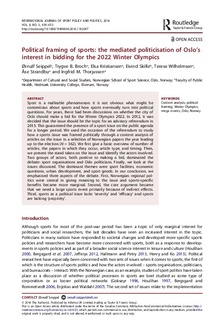| dc.contributor.author | Seippel, Ørnulf | |
| dc.contributor.author | Broch, Trygve B. | |
| dc.contributor.author | Kristiansen, Elsa | |
| dc.contributor.author | Skille, Eivind Å. | |
| dc.contributor.author | Wilhelmsen, Terese | |
| dc.contributor.author | Strandbu, Åse | |
| dc.contributor.author | Thorjussen, Ingfrid M. | |
| dc.date.accessioned | 2016-10-07T08:48:50Z | |
| dc.date.available | 2016-10-07T08:48:50Z | |
| dc.date.issued | 2016-05-14 | |
| dc.identifier.citation | International Journal of Sport Policy and Politics. 2016, 8, 439-453 | nb_NO |
| dc.identifier.uri | http://hdl.handle.net/11250/2413403 | |
| dc.description | © 2016 The Author(s). This is an Open Access article. | |
| dc.description.abstract | Sport is a malleable phenomenon: it is not obvious what might be contentious about sports and how sports eventually turn into political questions. For years, there had been discussions on whether the city of Oslo should make a bid for the Winter Olympics 2022. In 2012, it was decided that the issue should be the topic for an advisory referendum in 2013. This guaranteed the presence of a sport issue on the public agenda for a longer period. We used the occasion of the referendum to study how a sports issue was framed politically through a content analysis of articles on the issue in a selection of Norwegian papers the year leading up to the election (N = 362). We first give a basic overview of number of articles, the papers in which they occur, article type, and timing. Then, we present the stand taken on the issue and identify the actors involved. Two groups of actors, both positive to making a bid, dominated the debate: sport organisations and Oslo politicians. Finally, we look at the issues discussed. The dominant themes were sport facilities, economic questions, urban development, and sport goods. In our conclusion, we emphasised three aspects of the debate. First, Norwegian regional politics were central in giving meaning to the issue and sports-specific benefits became more marginal. Second, the core argument became that we need a large sports event primarily because of indirect effects. Third, sports as a political issue lacks ‘severity’ and ‘efficacy’ and sports are lacking ‘propriety’. | nb_NO |
| dc.language.iso | eng | nb_NO |
| dc.publisher | Taylor & Francis | nb_NO |
| dc.subject | content analysis | nb_NO |
| dc.subject | political framing | nb_NO |
| dc.subject | Winter Olympics | nb_NO |
| dc.subject | mega events | nb_NO |
| dc.subject | Oslo | nb_NO |
| dc.subject | Norway | nb_NO |
| dc.title | Political framing of sports: the mediated politicisation of Oslo’s interest in bidding for the 2022 Winter Olympics | nb_NO |
| dc.type | Journal article | nb_NO |
| dc.type | Peer reviewed | nb_NO |
| dc.subject.nsi | VDP::Social science: 200::Political science and organizational theory: 240 | nb_NO |
| dc.source.journal | International Journal of Sport Policy and Politics | nb_NO |
| dc.identifier.doi | http://dx.doi.org/10.1080/19406940.2016.1182047 | |
| dc.description.localcode | Seksjon for kultur og samfunn / Department of Cultural and Social Studies | nb_NO |
